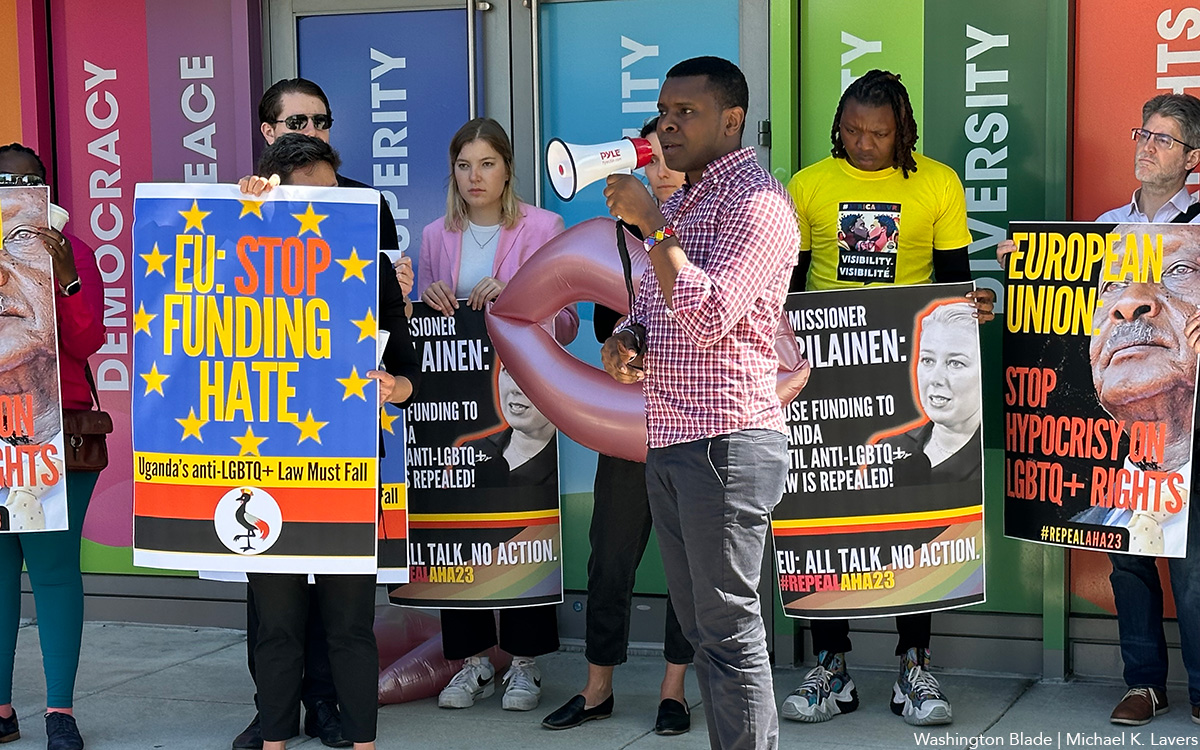European Union
European Court of Human Rights rules against Lithuania propaganda law
Children’s book author in 2019 challenged anti-LGBTQ statute

The European Court of Human Rights on Monday ruled Lithuania’s anti-LGBTQ propaganda law violates the European Convention on Human Rights.
Author Neringa Dangvydė Macatė in 2019 filed a lawsuit against the law after Lithuanian authorities censured her children’s book that featured two same-sex couples.
The law specifically bans the distribution of information to minors that “expresses contempt for family values, encourages the concept of entry into a marriage and creation of a family other than stipulated in the Constitution of the republic of Lithuania and the Civil Code of the republic of Lithuania.” The court in April 2022 heard Macatė’s case.
Openly gay U.S. Ambassador to Lithuania Bob Gilchrist is among those who have publicly criticized the law. Tomas Vytautas Raskevičius, an openly gay Lithuanian MP who is running for mayor of Vlinius, the country’s capital, told the Washington Blade the ruling will bolster efforts to repeal the propaganda law.
European Union
Activists demand EU sanction Uganda over Anti-Homosexuality Act
Yoweri Museveni signed law on May 29, 2023

More than a dozen activists who protested in front of the European Union Delegation to the United States in D.C. on Thursday demanded the EU to sanction Uganda over the country’s Anti-Homosexuality Act.
Hillary Innocent Taylor Seguya, a Ugandan LGBTQ activist, and Global Black Gay Men Connect Executive Director Micheal Ighodaro are among those who spoke at the protest. Health GAP Executive Director Asia Russell also participated in the event that her organization organized along with GBGMC and Convening for Equality Uganda, a Ugandan LGBTQ rights group.
Ugandan President Yoweri Museveni last May signed the Anti-Homosexuality Act that, among other things, contains a death penalty provision for “aggravated homosexuality.”
The country’s Constitutional Court on April 3 refused to “nullify the Anti-Homosexuality Act in its totality.” A group of Ugandan LGBTQ activists have appealed the ruling.
A press release that Health GAP issued ahead of Thursday’s protest notes EU Commissioner for International Partnerships Jutta Urpilainen on March 6 announced more than €200 million ($212.87 million) for Uganda in support of “small business owners, young female entrepreneurs, agribusinesses as well as vital digital infrastructure projects in full Team Europe format with the European Investment Bank (EIB) and several member states.”
“These concrete initiatives will make a difference to aspiring entrepreneurs, Ugandan businesses and create jobs in multiple sectors,” said Urpilainen in a press release that announced the funds. “This is a perfect example of how Global Gateway can make a tangible difference for citizens and businesses and unlock the full potential of a partner country by working together.”
Convening for Equality Uganda on Tuesday in a letter they sent to Urpilainen asked the EU to review all funding to Uganda and “pause or reprogram any funds that go via government entities.” The protesters on Thursday also demanded European Commission President Ursula von der Leyen “to hold Ugandan President Museveni’s government accountable for this attack on human rights.”
Josep Borrell, the EU’s top diplomat, in a statement he released after Museveni signed the Anti-Homosexuality Act said the law “is contrary to international human rights law and to Uganda’s obligations under the African Charter on Human and People’s Rights, including commitments on dignity and nondiscrimination, and the prohibition of cruel, inhuman or degrading punishment.”
“The Ugandan government has an obligation to protect all of its citizens and uphold their basic rights,” said Borrell. “Failure to do so will undermine relationships with international partners.”
“The European Union will continue to engage with the Ugandan authorities and civil society to ensure that all individuals, regardless of their sexual orientation and gender identity, are treated equally, with dignity and respect,” he added.
Urpilainen last September in a letter to the European Parliament said the EU would not suspend aid to Uganda over the law.
European Union
Gay Polish government minister represents change of course
Deputy Justice Minister Krzysztof Śmiszek took office in December

WARSAW, Poland — Poland’s only openly gay Cabinet minister on Tuesday spoke with the Washington Blade about the fight for LGBTQ rights in his country, Ukraine and U.S. politics.
Deputy Justice Minister Krzysztof Śmiszek assumed his post last Dec. 13 after Donald Tusk became prime minister.
The Civil Coalition, a group of opposition parties that Tusk leads, two months earlier won a majority of seats in the Sejm, the lower house of Poland’s parliament. President Andrzej Duda, an ally of the conservative Law and Justice party who opposes LGBTQ rights, remains in office as part of the governing coalition.
Śmiszek, a member of the New Left party, has been a member of the Sejm since 2019.
He was born Stalową Wola, a city in southeastern Poland that is close to the country’s borders with Ukraine and Slovakia. Śmiszek now represents Wrocław, the country’s third largest city that is located in southwestern Poland.
He is a lawyer who worked for the Campaign Against Homophobia, a Polish LGBTQ rights group, for several years before he entered politics. Śmiszek’s partner is former MP Robert Biedroń, who is now a member of the European Parliament.

Śmiszek noted to the Blade during an interview in his office that the Justice Ministry has introduced a bill that would add sexual orientation and gender identity to Poland’s hate speech and hate crimes laws.
The Council of Ministers, which includes members of Tusk’s Cabinet, is expected to approve the proposal in the coming weeks. Śmiszek said MPs will support the measure, even though critics say it would limit free speech.
“It was quite natural for us, I would say, to agree on that,” he told the Blade. “We all witnessed all these statements and horrible actions towards LGBT (people during the previous government.)”
Duda became Poland’s president in 2015.
He said before he defeated Warsaw Mayor Rafał Trzaskowski in the country’s 2020 presidential election that LGBTQ “ideology” is more dangerous than communism. Duda has also claimed LGBTQ Poles are “a threat to the family” and “want to sexualize children.”

More than 100 municipalities across Poland ahead of the election adopted resolutions that declared themselves “LGBT-free zones.”
The Law and Justice Party and Poland’s influential Roman Catholic Church supported them, while the European Union cut funding to municipalities that adopted them. The Warsaw Voivodship Administrative Court on Feb. 6 struck down the country’s final “LGBT-free zone” resolution that Mordy, a town in Siedlce County in eastern Poland that is roughly half way between Warsaw and the Belarusian border, adopted in 2019.
Tusk has indicated his support of a civil partnership bill, but Śmiszek conceded it will be a “huge” challenge to secure passage in parliament because it is not an official part of the coalition government’s manifesto.
Śmiszek noted Poland has dropped its opposition to the case of a transgender man who filed a lawsuit in the European Union Court of Justice in Luxembourg after Romania refused to recognize his legal name and gender change that he received in the U.K.
“We are trying not only to change the legal situation of LGBTI folks here in this country, but also we are taking a completely new approach, also of Poland, as a member of the European Union,” he said.
The Justice Ministry last month for the first time with LGBTQ activists.
Śmiszek said former Justice Minister Zbigniew Ziobro, a member of the right-wing Sovereign Poland party, wrote many of the previous government’s proposals that targeted LGBTQ people and women. Śmiszek further described the ministry before the current government took office as a “governmental center of anti-LGBTI actions.”
“That was a very moving meeting that after eight years of hatred that was produced here in this ministry,” he said.
Śmiszek pointed out Duda’s first presidential veto was a bill that would have made the process through which transgender Poles could undergo gender-affirming surgery easier. Śmiszek said the new government wants “to make the lives of trans people a bit better and bearable in terms of relations with the state and with relations with the administration,” but conceded it “is difficult.” He also said Duda, the Constitutional Tribunal and the Catholic Church remain barriers to the advancement of LGBTQ rights.
“We are not starting from scratch in terms of new initiatives,” Śmiszek told the Blade. “We are getting back to the good solutions.”
“However, we are fully aware that there are plenty of conservative anchors and blockages in the institutional architecture,” he added.
Śmiszek also said his sexual orientation is not an issue to Tusk, to his fellow ministers and MPs.
“I haven’t heard any discussion or hesitation about should we have this guy in the ministry or not,” he said. “My sexual orientation is not an issue at all.”

Poland knows Russia ‘very well’
Russia on Feb. 24, 2022, launched its war against Ukraine.
Śmiszek noted upwards of 2 million Ukrainians sought refuge in Poland, and many of them have remained in the country.
“Polish society passed its exam in terms of humanitarian aid and compassion for those who are victims of this aggressive war of Russia,” said Śmiszek.
A Russian missile on Nov. 15, 2022, killed two people in Przewodów, a village Hrubieszów County that is on the Ukrainian border. Another Russian missile on March 24 briefly entered Polish airspace near Oserdów, a village that is less than five miles away from Przewodów.
Śmiszek told the Blade he is increasingly concerned the war will spread to the Baltic countries — Lithuania, which borders Poland, and Latvia and Estonia — and to Poland itself.
The Russian exclave of Kaliningrad on the Baltic Sea also borders Poland.
“We are observing now, especially during the last few months, that something is going to happen,” he said.
Śmiszek acknowledged Ukraine in recent months has suffered setbacks on the battlefield, and the U.S. “is not very open to providing any help.”
“You can see Trump, what he is saying. You can also see some Western countries that are still hesitating,” he said. “This is a growing, unspoken emotion within Polish society that something is going to happen, the war will knock on our doors soon, in the next couple of years, and we are the second or third target of Putin if he’s not stopped by the united West.”
Śmiszek added Poland knows the Russians “very well.”
“That is why this is not something unusual when a Pole thinks about Russians invading our country,” he said. “It’s happened before.”
Tusk and Duda last month met with President Joe Biden at the White House in the hopes that Congress would pass a Ukraine funding bill. Śmiszek while speaking to the Blade criticized the delay.
“I know that they are trying to build their popularity, saying we should not spend billions of dollars for the wars that do not concern us and Russia will never attack us, blah, blah, blah,” he said. “In a way I do understand this rhetoric, but I don’t understand … it’s really a short-sighted approach.”
“I really count on changing the approach of the U.S. because this is really a huge threat to world democracy, to human rights and we always perceive the U.S. as a kind of element of guarantees for democracy around the world,” added Śmiszek. “This time the U.S. is not passing its exam, especially the conservative part of American politics.”

Śmiszek said Poland will continue to work with the U.S., regardless of who wins this year’s presidential election. He did, however, express concerns over former President Trump based on his positions on LGBTQ and reproductive rights, his U.S. Supreme Court nominees and Ukraine.
“This is kind of worrying,” said Śmiszek. “This kind of approach to fundamental issues very relevant to the stability of the world is now in the hands of the guy who you cannot predict what his decisions will be when the time comes and it will be a need for taking very serious decisions concerning the stability of the world.”
“He portrays himself as quite unstable I would say in terms of values he wants to defend,” he added.
European Union
Irish Prime Minister Leo Varadkar announces resignation
Gay head of government first elected in 2017

Irish Prime Minister Leo Varadkar on Wednesday announced he will step down once his party selects his successor.
Varadkar, who is gay, also said he will immediately resign as Fine Gael’s leader.
“My reasons for stepping down are both personal and political,” said Varadkar in comments he made outside the government’s offices in Dublin, the Irish capital.
Varadkar, 45, became Ireland’s first gay prime minister in 2017.
He raised LGBTQ issues with Pope Francis when he visited Ireland in 2018.
Varadkar the following year attended a St. Patrick’s Day breakfast at then-Vice President Mike Pence’s official residence in D.C. with his husband, Dr. Matthew Barrett. Varadkar and Barrett last week attended a St. Patrick’s Day event that Vice President Kamala Harris and second gentleman Doug Emhoff hosted at the Naval Observatory.
Varadkar in 2020 stepped down after Fine Gael lost 15 Parliament seats in a general election, but remained in the Irish government. Varadkar once again became prime minister in 2022.
Varadkar announced his resignation four days after Irish voters rejected proposals that would have amended language in the country’s constitution that says a woman’s place is in the home and families are based on marriage. (Ireland in 2015 became the first country to extend marriage rights to same-sex couples through a referendum.)
The Irish government last year pledged to ban so-called conversion therapy. The country’s hate speech law has included gender identity since 2022.
“I’ve proudly made the country a more equal and more modern place when it comes to children, the LGBT community, equality for women and their bodily autonomy,” said Varadkar.
-

 District of Columbia4 days ago
District of Columbia4 days agoCatching up with the asexuals and aromantics of D.C.
-

 South America3 days ago
South America3 days agoArgentina government dismisses transgender public sector employees
-

 Maine4 days ago
Maine4 days agoMaine governor signs transgender, abortion sanctuary bill into law
-

 District of Columbia4 days ago
District of Columbia4 days agoBowser budget proposal calls for $5.25 million for 2025 World Pride












